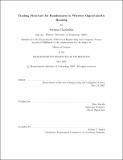Trading structure for randomness in wireless opportunistic routing
Author(s)
Chachulski, Szymon (Szymon Kazimierz)
DownloadFull printable version (443.1Kb)
Other Contributors
Massachusetts Institute of Technology. Dept. of Electrical Engineering and Computer Science.
Advisor
Dina Katabi.
Terms of use
Metadata
Show full item recordAbstract
Opportunistic routing is a recent technique that achieves high throughput in the face of lossy wireless links. The current opportunistic routing protocol, ExOR, ties the MAC with routing, imposing a strict schedule on routers' access to the medium. Although the scheduler delivers opportunistic gains, it eliminates the clean layering abstraction and misses some of the inherent features of the 802.11 MAC. In particular, it prevents spatial reuse and thus may underutilize the wireless medium. This thesis presents MORE, a MAC-independent opportunistic routing protocol. MORE randomly mixes packets before forwarding them. This randomness ensures that routers that hear the same transmission do not forward the same packets. Thus, MORE needs no special scheduler to coordinate routers and can run directly on top of 802.11. We analyze the theoretical gains provided by opportunistic routing and present the EOTX routing metric which minimizes the number of opportunistic transmissions to deliver a packet to its destination. We implemented MORE in the Click modular router running on off-the-shelf PCs equipped with 802.11 (WiFi) wireless interfaces. Experimental results from a 20-node wireless testbed show that MORE's median unicast throughput is 20% higher than ExOR, and the gains rise to 50% over ExOR when there is a chance of spatial reuse.
Description
Thesis (S.M.)--Massachusetts Institute of Technology, Dept. of Electrical Engineering and Computer Science, 2007. This electronic version was submitted by the student author. The certified thesis is available in the Institute Archives and Special Collections. Includes bibliographical references (leaves 71-73).
Date issued
2007Department
Massachusetts Institute of Technology. Department of Electrical Engineering and Computer SciencePublisher
Massachusetts Institute of Technology
Keywords
Electrical Engineering and Computer Science.